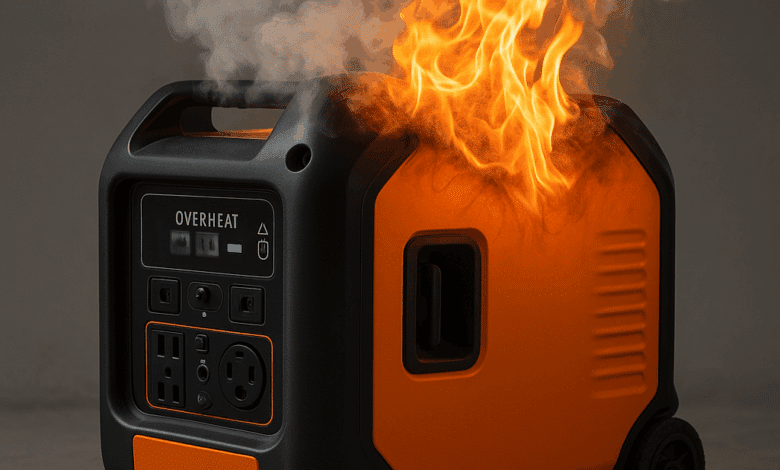Generator Overheating: Causes, Problems, and Effective Solutions

Overheating is one of the most common and serious issues affecting both portable and diesel generators. Whether you’re relying on a generator for home backup, outdoor activities, or industrial power, excessive heat can lead to major damage and costly repairs.
While many modern portable generators are equipped with overload alarms, low-oil shutoff systems, and temperature sensors, not all units—especially larger standby or diesel generators—come with these protective features. Without proper monitoring and care, overheating can shorten your generator’s lifespan or even cause fires.
In this guide, we’ll walk you through the dangers of generator overheating, explore the most common causes, and provide practical tips to prevent it—so you can keep your generator running safely and efficiently.
🔥 Why Generator Overheating Is Dangerous
When a generator runs too hot, it’s not just the engine at risk—the alternator can overheat too, damaging its internal insulation. If left unchecked, this could result in serious failures, electrical malfunctions, or even fire. One of the first components to give out is usually the voltage regulator, which plays a key role in power output stability.
⚠️ Common Reasons a Portable Generator Overheats
1. Blocked Exhaust System
A blocked exhaust can trap hot gases inside the unit. Snow, dust, debris, or even animal nests can restrict airflow. Always inspect the exhaust pipe before starting the generator.
2. Dirty or Dry Air Filter
When air filters are clogged with dust or dirt, airflow is restricted. This can prevent proper combustion, increase internal friction, and lead to overheating. Regular cleaning and checking for air leaks around the filter gasket are essential.
3. Overloading the Generator
If your generator has a running capacity of 1800 watts and you’re using appliances that draw close to or above that limit, it will overwork. Without an overload alarm, this constant strain can result in engine overheating, component failure, or even feedback surges that damage connected devices.
4. High External Temperatures
Extreme outdoor heat—especially in direct sunlight—can raise the generator’s internal temperature beyond safe limits. If temperatures in your area hit 120°F or more, metal components can become dangerously hot and even combust.
💡 Tip: Always place your generator in a shaded or ventilated shelter to reduce heat buildup.
5. Low or Degraded Oil
Engines rely on oil for smooth operation. If you skip oil changes or ignore low levels, the oil becomes thick and dirty, increasing friction and raising engine temperatures. This can lead to piston and valve damage over time.
💧 Can You Cool an Overheated Generator with Water?
Absolutely not. Spraying water on an overheated generator can be dangerous. It increases the risk of electrical shock, internal rusting, and water intrusion into sensitive components. The safest method is to turn it off and let it cool naturally.
✅ How to Prevent Portable Generator Overheating
Here’s how to avoid overheating issues:
- Shut down immediately if you notice excessive heat.
- Use the generator in a ventilated area. Avoid enclosed or poorly ventilated spaces.
- Keep it out of direct sunlight. Use a canopy or cover with airflow.
- Change oil as recommended in the user manual.
- Clean the air filter regularly. Replace if necessary.
- Avoid overloading. Always stay within the rated capacity.
- Check the exhaust system for blockages or damage.
- Perform routine maintenance and check for fluid leaks or worn parts.
⚙️ Why Diesel Generators Overheat (And How to Stop It)
Diesel generators are built for heavy-duty use, but they are not immune to overheating. Along with the typical causes mentioned for portable units, diesel generators face additional risks:
Common Causes of Diesel Generator Overheating:
- Coolant leaks from loose clamps or cracked gaskets
- Broken or non-functional cooling fan
- Low oil levels causing engine friction
- Damaged or blocked exhaust systems
- Clogged diesel fuel injectors
- Electrical overloading
How to Prevent Diesel Generator Overheating:
- Ensure proper airflow inside and around the generator housing.
- Install exhaust fans or vents if the unit is in an enclosed area.
- Use high-quality fuel and coolant.
- Check coolant and oil levels regularly.
- Avoid running at full capacity continuously.
- Stick to a maintenance schedule to catch issues early.
❓ Frequently Asked Questions
Q: How can I tell if my generator is overheating?
A: Signs include loud mechanical noise, strong vibrations, heat radiating from the body, and sometimes, a sudden power surge. Many modern generators have a temperature warning light or gauge to signal overheating.
Q: What should I do if my generator overheats?
A: Turn it off immediately. Let it cool down completely. Then, check for oil levels, blockages in the exhaust or air filter, and any signs of debris in the fuel or carburetor system.
Q: How can I stop my generator from overheating in the future?
A: Stick to a regular maintenance schedule, avoid running it at full load for long periods, ensure proper airflow, keep it out of direct sunlight, and always use fresh oil and clean filters.
Overheating can sneak up on even the most well-built generators—but it’s almost always preventable. With regular maintenance, smart operation, and awareness of the environment around your unit, you can avoid expensive breakdowns and extend the life of your generator.




![How to Bypass CO Sensor on Generator – [4-Step Safety Guide]](https://www.generator411.com/wp-content/uploads/2025/08/co-sensor-on-generator-390x220.png)